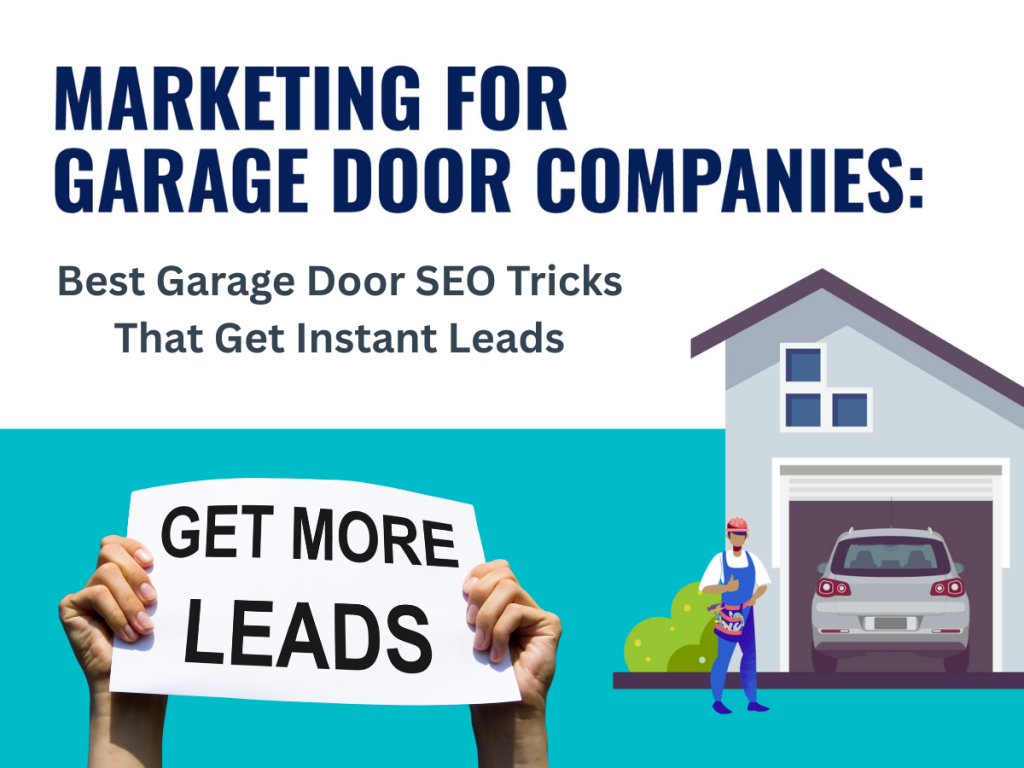Top 7 Garage Door SEO Tricks That Get Instant Leads
Let’s be honest—getting leads for your garage door business isn’t always easy. I’ve seen folks spend a ton on ads and still come up short. But when you get SEO right, it’s like flipping a switch—suddenly, the phone starts ringing with people who actually need your service. Here are the top 7 garage door SEO tricks that have worked for the clients after taking Garage Door Repair Digital Marketing Services
-
Optimize for Local Searches (Like, Really Local): Garage Door SEO Tricks
Most garage door businesses serve a specific area, so you’ve got to show up when someone types “garage door repair near me” or “garage door company in [your city].” Create a unique page for each town or neighbourhood you serve. Don’t just slap the city name in the title—talk about the area, mention local landmarks, and maybe even share a story about a job you did in that neighbourhood. Google loves this stuff, and it helps you pop up in the map pack12.
-
Nail Your Title Tags and Meta Descriptions: Garage Door SEO Tricks
Your title tag is like the sign on your shop—make it clear and inviting. Keep it under 60 characters and include your main keyword. The meta description is your chance to convince someone to click. Try something like “Fast, friendly garage door repair in Tampa—same-day service, free estimates.” Keep it short, sweet, and packed with value12.
-
Make Your Website Fast and Mobile-Friendly: Garage Door SEO Tricks
I can’t tell you how many garage door sites I’ve seen that load slower than a stuck door. If your site takes more than two seconds to load, you’re losing customers. And if it doesn’t look good on a phone, forget about it. Most people search for garage door help on their phones, so make sure your site works great on any device13.
-
Use Before-and-After Photos and Customer Reviews: Garage Door SEO Tricks
People want to see what you can do. Add a gallery with before-and-after photos of your work. And don’t be shy about sharing customer reviews. A quote like “Samantha in Naples said, ‘They showed up the same day and got my garage door back on track in under an hour!’” goes a long way. It builds trust and helps you convert visitors into customers13.
-
Sprinkle Keywords Naturally—No Stuffing: Garage Door SEO Tricks
You want to use your target keywords, but don’t overdo it. Write for people first, then tweak for search engines. If it sounds weird or forced, you’re doing it wrong. Use keywords in your headings, image alt text, and URLs, but keep it natural12.
-
Get Listed in Local Directories and Citations: Garage Door SEO Tricks
Local listings like Google Business Profile, Bing Places, and home service directories (Angi, HomeAdvisor, etc.) are gold. Make sure your business name, address, and phone number (NAP) are consistent everywhere. The more places you’re listed, the more Google trusts you13.
-
Add Schema Markup for Extra Visibility: Garage Door SEO Tricks
Schema markup is like speaking Google’s language. It helps search engines understand your business info—address, phone, hours, reviews—and can get you featured in rich snippets and knowledge panels. If you see a listing with star ratings and review counts, that’s schema markup at work. Tools like Schema Markup Generator make it easy to add to your site14.
Personal Experience Tangent: Garage Door SEO Tricks
I remember working for a small garage door company that was barely getting any calls. We re-built their site, added local pages, and got them listed in a bunch of directories. Within a month, they were getting more leads than they could handle. The owner called me and said, “I don’t know what you did, but my phone won’t stop ringing!” That’s the power of local SEO.
Why These Tricks Work: Garage Door SEO Tricks
These tricks work because they make your business easy to find and trustworthy. When someone has a broken garage door, they want help fast. If you show up at the top of search results with good reviews and clear info, you’re the one they’ll call.
Next Steps: Garage Door SEO Tricks
Start with one or two of these tricks and build from there. Don’t try to do everything at once—you’ll just get overwhelmed. Focus on what matters most for your business and your customers. And remember, SEO isn’t a one-time thing. Keep updating your site, adding new content, and listening to your customers.
More Read: Ways to Get Affordable Marketing services for Small Business
Why 90% of Garage Door Businesses Fail at SEO (How to Win)
Let’s get real—most garage door businesses struggle with SEO. I’ve seen it time and time again. They throw up a website, maybe do a little SEO, and then wonder why they’re not getting any leads. The truth is, 90% of them are making the same mistakes. Here’s why they fail and how you can win.
Mistake 1: Ignoring Local SEO: Garage Door SEO Tricks
Garage door businesses are local by nature. If you’re not showing up for “garage door repair in [your city],” you’re missing out on your best customers. I’ve seen companies spend a fortune on national ads, but if you’re not ranking locally, you’re invisible to the people who need you most13.
Mistake 2: Keyword Stuffing and Bad Content: Garage Door SEO Tricks
Some folks think SEO is about cramming as many keywords as possible into their content. That’s a sure-fire way to get ignored by Google and annoy your visitors. Write for people first, then tweak for search engines. If your content is thin or duplicated from other sites, Google will punish you for it24.
Mistake 3: Inconsistent Business Info: Garage Door SEO Tricks
If your business name, address, or phone number is different on Google, Yelp, and your website, you’re confusing both customers and search engines. Make sure your NAP (name, address, phone) is consistent everywhere. Tools like Bright Local can help you keep track14.
Mistake 4: Neglecting Reviews and Social Proof: Garage Door SEO Tricks
People trust other people. If you don’t have reviews or testimonials on your site, you’re missing out. I’ve seen businesses with great service but no online reviews, and they struggle to get leads. Ask your happy customers to leave a review—it makes a huge difference13.
Mistake 5: Slow, Outdated Websites: Garage Door SEO Tricks
If your site looks like it’s from the 90s and loads like molasses, people will bounce faster than a broken garage door spring. Make sure your site is fast, mobile-friendly, and easy to navigate. A clear call-to-action at the top of the page can turn visitors into customers13.
Mistake 6: Not Using Schema Markup: Garage Door SEO Tricks
Schema markup helps Google understand your business info and can get you featured in rich snippets. If you’re not using it, you’re missing out on extra visibility. It’s not as hard as it sounds—tools like Schema Markup Generator make it easy14.
Mistake 7: Forgetting About Off-Page SEO: Garage Door SEO Tricks
SEO isn’t just about your website. Getting backlinks from other reputable sites (like local business directories or neighbourhood blogs) helps Google trust you more. Sponsor a local event, join your Chamber of Commerce, or guest post on a local blog. These little connections can lead to big gains12.
Personal Experience Tangent: Garage Door SEO Tricks
I once worked with a garage door company that had a beautiful website but was getting zero leads. Turns out, their business info was all over the place—different phone numbers on different sites, and no local pages. We cleaned it up, got them listed in a few directories, and within weeks, they were ranking for local searches and getting calls.
How to Win at Garage Door SEO Tricks
- Focus on local SEO: Create unique pages for each service area, optimize your Google Business Profile, and get listed in local directories13.
- Write helpful, original content: Blog about common garage door problems, safety tips, and maintenance advice. This builds trust and keeps your site fresh12.
- Keep your business info consistent: Use the same name, address, and phone number everywhere14.
- Ask for reviews and showcase them on your site: Social proof is powerful13.
- Make your site fast and mobile-friendly: People want help fast, and they’re usually on their phones13.
- Use schema markup: It helps Google understand your business and can get you featured in rich snippets14.
- Build backlinks and local citations: The more reputable sites that link to you, the better12.
Final Thoughts: Garage Door SEO Tricks
SEO isn’t complicated like any rocket science, but it does need you to pay attention and work on it. Avoid these typical errors, pay attention to what’s most important for your business and you’ll outperform 90% of your competitors. SEO takes time and effort, so treat it as a long race. Don’t give up and your leads will start to grow.
Get 5 Times More Leads with These Long-Tail Garage Keywords: Garage Door SEO Tricks
If your garage door business is not getting many leads, many others share your experience. I’ve experienced this as a agency owner and I know it can be tough, but the right keywords can really help. I’m not just referring to the common services such as garage door repair. The keywords I’m referring to are the ones that attract the most qualified leads.
What Do Long-Tail Keywords Mean?
Long-tail keywords are detailed expressions individuals use when they are about to make a choice. For instance, instead of “garage door,” they could look up “why my garage door won’t open in Tampa” or “garage door opener installation near me.” Because there is less competition for these searches, the people using them are more interested in contacting you5.
What Makes Long-Tail Keywords Effective
I have noticed that some businesses choose only main keywords and get lost with the competition. If you use long-tail keywords, you are talking to people who already have a clear idea of what they want. They aren’t just looking around—they’re prepared to hire a worker. That’s the reason long-tail keywords can help you get five times as many leads as generic ones5.
How to Identify Long-Tail Keywords
There are many tools available, but you don’t need anything special to begin. Consider the issues that your customers want to know about. Look at these long-tail keywords for businesses in the garage door industry: “garage door spring replacement cost”
“emergency garage door repair near me”
“how to fix a noisy garage door”
“garage door won’t close all the way”
“best garage door company in [your city]”
“garage door installation prices”
“garage door remote not working”
“garage door opener repair service”
You can also use free tools like Google’s Keyword Planner or Uber suggest to find more ideas5.
Personal Experience Tangent: Garage Door SEO Tricks
A few years back, I helped a small garage door company that was only targeting “garage door repair.” They were getting some traffic, but not many leads. We started creating content around long-tail keywords like “garage door stuck open in winter” and “garage door cable replacement cost.” Within a couple of months, their leads doubled—and the quality of those leads was much better. People were calling with specific problems, ready to book a service.
How to Use Long-Tail Keywords on Your Site
- Create blog posts and service pages around these keywords. For example, write a post called “How to Fix a Garage Door That Won’t Open” or “Garage Door Spring Replacement Cost: What to Expect.”
- Use long-tail keywords in your headings, meta descriptions, and image alt text. But don’t overdo it—keep it natural and helpful25.
- Answer common questions. If people are searching for “why is my garage door making noise,” write a post that answers that question. This builds trust and helps you rank for those searches.
- Update your content regularly. The more helpful and up-to-date your content, the more Google will favor your site25.
Bonus Tip: Use Long-Tail Keywords in Your Google Ads
Long-tail keywords aren’t just for SEO—they’re great for Google Ads, too. They’re usually cheaper and more targeted, so you get more returns on your money spend. Try running ads for phrases like “emergency garage door repair near me” and see how it goes35.
Why This Works: Garage Door SEO Tricks
When you target long-tail keywords, you’re not just getting more traffic—you’re getting better traffic. The people who find you are more likely to need your service and ready to hire you. That means more leads, more jobs, and more happy customers.
Next Steps: Garage Door SEO Tricks
Start by making a list of long-tail keywords that match your services and your customers’ needs. Create content around those keywords, and watch your leads grow. And remember, SEO is about helping people solve their problems. If you do that, the rest will take care of itself.
Final Thought: Garage Door SEO Tricks
Don’t get caught up in chasing the big, broad keywords. Focus on the long-tail phrases that bring in real customers. It’s a simple shift, but it can make a huge difference for your garage door business.







